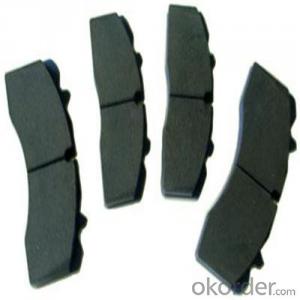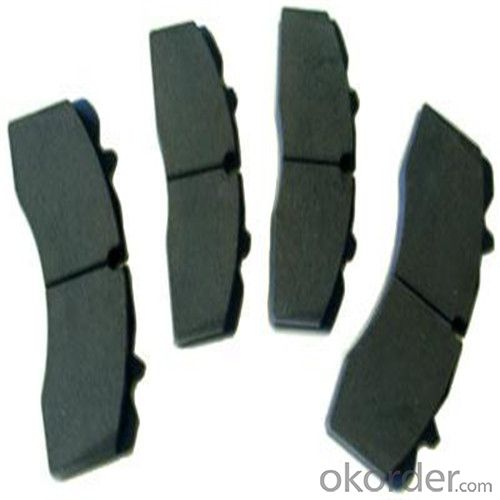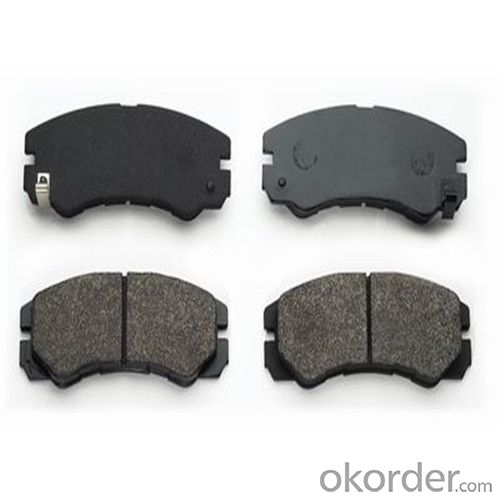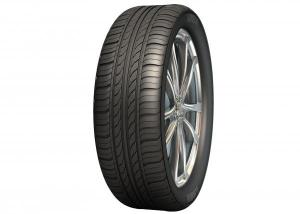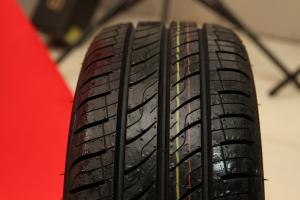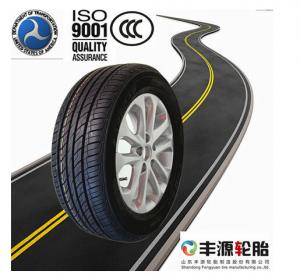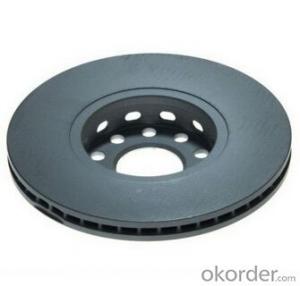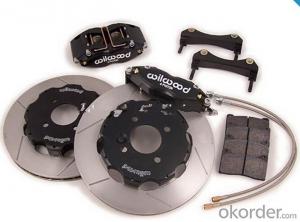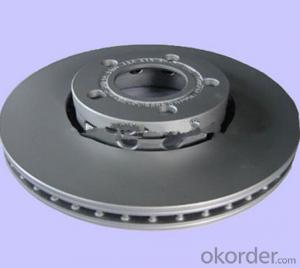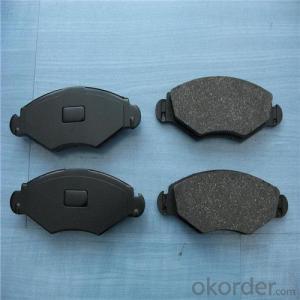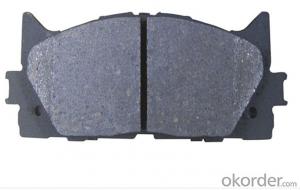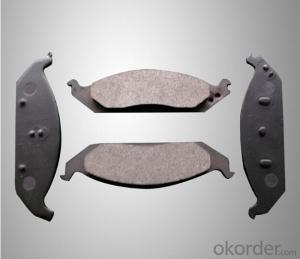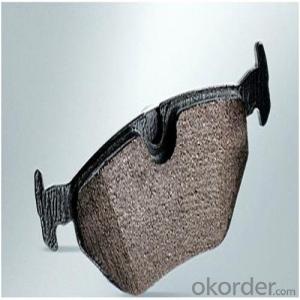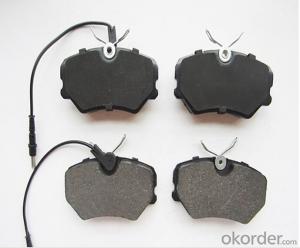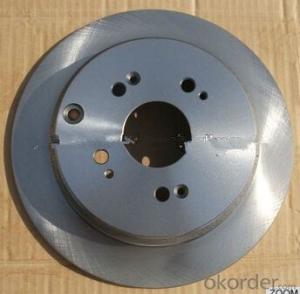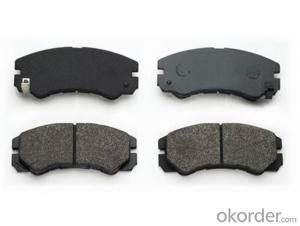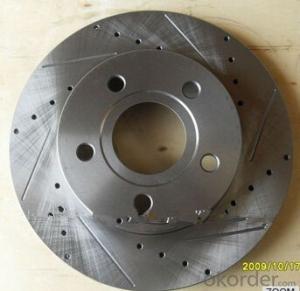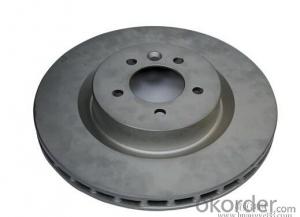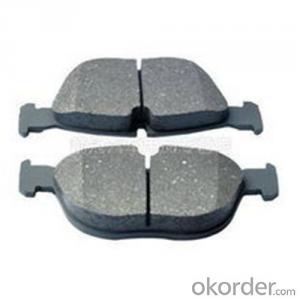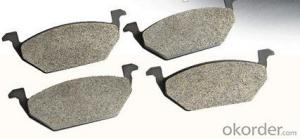Auto Parts Brake Pads Price/ Supplier
- Loading Port:
- China main port
- Payment Terms:
- TT OR LC
- Min Order Qty:
- 20000 pc
- Supply Capability:
- 2000000 pc/month
OKorder Service Pledge
OKorder Financial Service
You Might Also Like
Quick Details
Packaging :
| Packaging Details: | Usually packed by Neutro packing inside,white/colored carton outside |
| Delivery Detail: | within 30 days after deposit |
Specifications
Japanese car brake pads
1.Good performance of brake pads with long life time
2.No black dust residue
3.Less brake disc wear
1.Material:
Semi-metallic, low-metallic and ceramic, Non-asbestos.
2.Certificate:
ISO9001 and TS16949 approved.
3.Advantage:
-Significantly reduced dust development
-Practically noise-free
-Better rim appearance
-Greater comfort
-No brake judder
-Better environmental protection
-Lower repair costs
-Very safe
4.The price will be sent to you soon after get your OEM or Drawings.
We are trying to do our work better to improve our products so that we can make all of our customers' satisfied. All inquires will be greatly appreciated.
FAQ:
Q1: Why buy Materials & Equipment from OKorder.com?
A1: All products offered by OKorder.com are carefully selected from China's most reliable manufacturing enterprises. OKorder.com adheres to the highest standards and a commitment to supply chain safety and customer satisfaction.
Q2: How do we guarantee the quality of our products?
A2: We have established an advanced quality management system which conducts strict quality tests at every step, from raw materials to the final product. At the same time, we provide extensive follow-up service assurances as required.
picture of brake pad:
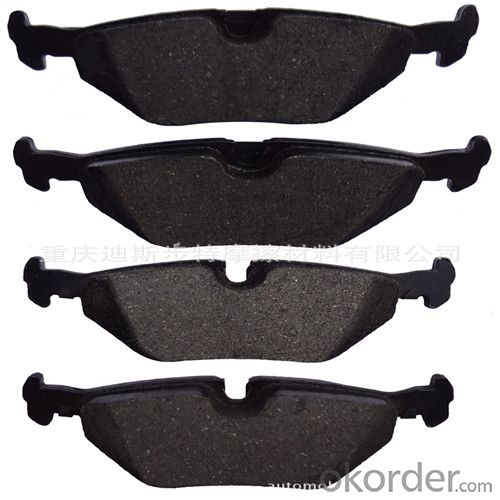
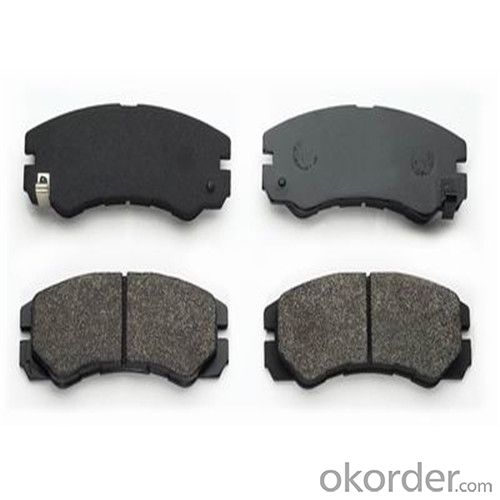
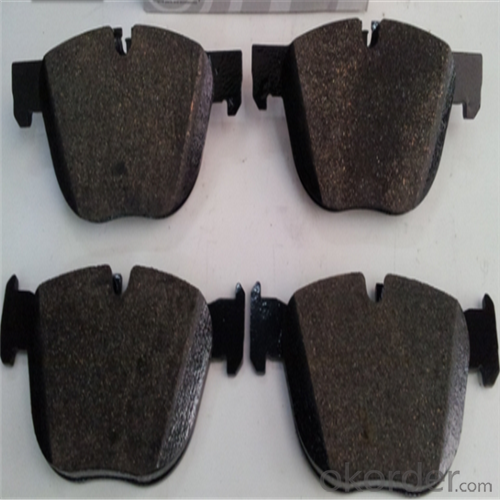
- Q: How do you ABS Brakes work and how are they different from traditional brakes?
- Traditional brakes work by forcing brake fluid to the brake pads-you pushing on the pedal pushes the fluid which pushes the brakes-the harder you push, the harder you brake. You can pump traditional brakes yourself by getting on and off the brake pedal. This is how you attempt to retain some steering control in slippery situations. ABS brakes have a pump built into the system that will do this for you about 5000 times a minute-much more effective than you can do yourself. ABS brakes are activated either by depressing the brake pedal far enough to activate a switch or on some cars a computer monitors wheel lockup to determine when ABS is necessary. This is why auto manuals tell you to brake very hard in slippery conditions- to ensure that your anti-lock is activated-to ensure the best steering control and shortest stopping distance.
- Q: Can someone give me the procedures to gravity bleed a brake system?
- you pop the master cylinder brake lid off then crack the bleeder screw on the farthest wheel away and let it bleed. After its running clear tighten it up then crack the next one loose then do the fronts closer to the wheels. i hope i didn't confuse you. haha hope it helps
- Q: I have a super pocket bike with hydraulic brakes, and the rear brakes don‘t work. I was pretty sure it was the brake fluid, so I bled the system a few times over, and still, the caliper moves very little (an eighth of an inch, maybe). There are no leakes in the the system. What could be wrong?
- -The master cylinder (The cylinder with actuator lever) may be faulty and allowing pressure to flow past the seals. You will have no leaks, as the pressurized brake fluid will pass back into the reservoir. Overhaul seal kits are available. -You may be improperly bleeding the brakes, not removing OR allowing more air into the brake system. -Possible that the slave cylinder (The one that is actuating the brakes) is locking up. The piston sometimes corrodes, or the housing itself can warp, causing them to lock togetherpermitting little or no movement. Overhaul kits are available, but better idea to replace the assembly, as the problem may return. Try this With a full master cylinder, pump the brake lever 2-3 times to allow pressure build up. (More pumping only invites any air/brake fluid mix to start foaming). While holding the lever down (like you are still braking), release the bleed valve (on slave cylinder). A little shot of brake fluid/air will escape the cylinder. Close the port off completely.repeat as many times as needed until pressure builds up. At no point should you release the brake lever while the bleed port is open. That will allow air to be sucked back in. If this doesn't work, it is a mechanical or seal problem which requires disassembly. Here in Japan, these bikes are quite commonplace. Slightly larger versions (50cc) are street legal. Good luck!
- Q: I‘ve been handed a physics problem and I need to find some resource to either convert or locate the force applied by a vehicles (large automotive) brakes.
- One way to get an estimate is to do a test where you apply the brakes to the moving car, and measure the time required to reduce the speed by some amount (you could go all the way to a stop but that would probably exaggerate the error inherant in this estimate). If you were going 100 km/hr , and you applied the breaks and dropped to 25 km/hr in 3 seconds, and you assumed a constant braking force, you could calculate that force (given the weight of the car, and ignoring air resistance and miscellaneous frictional decellerators) First you calcualate the deceleration a needed to change the speed 25 km/hr in 3 seconds. 25 km/hr is about 7 meters/sec. So, the acceleration due to the brakes is 25/73.6 m/sec^2. Now remembering that Fma you can solve for the braking force if you know the car mass. If you get your units converted correctly your force will be in Newtons. This is just one way to make an estimate based on something that is fairly easy to measure.
- Q: I have a 2006 Z71 with a 3 body lift that I had put on about 2 months ago. Everything went well but now the service brake system message is displayed with the ABS and Emergency light lit up. I took it to the chevy dealership and they said it could be a short. Any other suggestions of what it might be and how I could fix it
- check the brake module under the truck on the frame rail drivers side almost right under the drivers seat. make sure you plugged it back in. check the obvious,,, fuses. wheel speed sensors
- Q: Also if you know of the best possible braking system, that includes Brake Calipers, and Brake Disc please let me know. I want to put the best possible system in my car.
- Look on the side of the tires it's stamped on them.
- Q: when the car thinks its loaded down the brakes work harder.but when you lower the car it thinks its loaded and brakes work too hard and can cause lock ups. does anyone know if preludes have height sensitive control valves on the braking system?
- the prelude has 4 wheel disc and ABS on some vehicles. The height valve you are asking about is commonly used on trucks such as the Nissan truck with rear drum brakes to balance the braking when the truck bed is loaded down. Honda does not use that type of valve on any of its vehicles. if you have a problem with lock up check for air in the system first. Then if its locking up after bleeding the air out of the system see if you can identify which wheel is locking up. I would guess you don't have ABS if you're locking a wheel up. If you identify what wheel is locking then you can look at the calipers, pads and hydraulics for that wheel to find the problem. hope that helps
- Q: The bike I ordered online has hydraulic disc brakes and was wondering what advantages will these have over the mechanical disc brakes. Are the less likely to lock up than mechanical brakes? Do their pads last longer?Can I use any disc brake pads regardless of the make and model of the disc brake system on my bike?
- They are a far superior system for the trial for moderate to advanced off road riding. Just as mechanical discs are superior to rim brakes Hydraulics are superior to mechanical discs mechanical brakes tend to go out of adjustment often and require more maintenance hydraulic brakes are easier to modulate and provide superior braking control. Control is a big factor and you can ride with more confidence I have ridden both systems and recently replace my mechanical with hydraulics on my second mtb which needed pads
- Q: 2 weeks ago I took my car to Monro Muffler to get new brake pads. calipers, and rotors. Just yesterday, I noticed that my brake pedal goes all the way to the floor, before the car even starts to slow down. What could the problem be? Could it be something they didn‘t put in right, or something completely unrelated? It‘s a 1998 Honda CRV.
- Most likely your brake system was improperly bled. there is probably air in the lines, and needs to be removed for the brake system to operate properly. Call Monro and let them be responsible for getting your car back to their shop for the repair at their expense.
- Q: When I‘m driving and use my brakes, the brake pedal sinks down before actually slowing down the car, and sometimes it skips on the rotors.what could be the problem here?something wrong with the brake system?2000 Ford Contour SE Front wheel drive.about 143 thousand miles.
- I'd say it's time for a brake job. Did you know that if you don't change your brake fluid every 3 to 5 years, it absorbs moisture from the air, and then chemically changes to corrode the rubber parts in your brake system? Yeah, well, it's true. You'll have rubber seals start to leak, and you'll see wet spots on your wheels a few miles before they fail. Then you'll drive right through an intersection or over a cliff, and you'll have other things to worry about.
Send your message to us
Auto Parts Brake Pads Price/ Supplier
- Loading Port:
- China main port
- Payment Terms:
- TT OR LC
- Min Order Qty:
- 20000 pc
- Supply Capability:
- 2000000 pc/month
OKorder Service Pledge
OKorder Financial Service
Similar products
Hot products
Hot Searches
Related keywords
